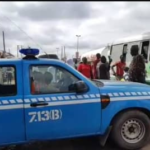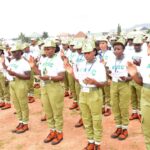
The dream of having a functional inland port in Lokoja, the Kogi State capital to boost economic and commercial activities for the people seems to have remained elusive in the last nine years.
The idea of building an inland port in Lokoja, alongside the dredging of Niger River, was first conceived by the late President Umar Musa Yar’Adua, almost a decade ago.
It was learnt that the project was first awarded to Messers Foby Engineering Ltd at the cost of N2.3 billion in 2007 and a mobilisation fee of N800 million was paid.
But due to the alleged inability of the contractor to perform, the contract was revoked, revised and subsequently re-awarded in the second quarter of 2012 to another company, Inter-Bau Construction Ltd, at the cost of N4.112 billion.
The administration of former President Goodluck Jonathan, who re-awarded the contract, gave 57 weeks as the expected period for the completion of the project.
But four years after the project was re-awarded, the Lokoja port is yet to be completed and put to use.
Briefing journalists after the contract was re-awarded, the then minister of information, Labaran Maku, indicated that the project, when completed, would open up “full blown economic activities in line with the transformation agenda of the federal government”.
“The process of evacuating agricultural produce, petroleum products, bulk cargoes and distribution of essential import items through the inland waterways will be given a boost.
“The federal government also envisages that the projects would stimulate increase in employment while improving the socio-economic development of the area. The overall effectiveness of inland waterway transportation system will be put to test while the socio-economic activities of communities will also be enhanced,” Maku said.
A recent check by Daily Trust on Sunday at the project site, situated at Jamata area of Lokoja, indicated that work was not going on at the river port.
The place looked deserted while most of the equipment and materials being used by contractors on the project site were abandoned and overgrown by grasses.
Our reporter observed that the road leading to the port was tarred, with a couple of structures also erected in the project site.
A former staff of the construction company told our correspondent that work stopped on the port since July this year. According to him, many of the workers were owed a backlog of salaries before the company closed shop and abandoned the site.
At the moment, the high enthusiasm, expectations and euphoria that heralded the re-award of the contract amongst members of the host community and other critical stakeholders in Kogi State, have since waned.
Stakeholders are now expressing worries over the delay in the completion of the project, which they believe would boost commercial and socio-economic activities in the state.
The paramount ruler of Lokoja, Alhaji Muhammadu Kabir Maikarfi III, expressed worry over the delay in completing the project despite the billions of naira spent by the federal government.
He lamented that the stalemate in the completion of the project, coupled with the dormancy of the inland waterway transportation in the state, had made people of Kogi to lose job opportunities and other economic benefits.
He recalled that Lokoja rose to prominence when the Europeans arrived in the 1960s and explored the use of the two waterways in West Africa as a major inland port for their companies, thus creating jobs for the youth.
Maikarfi, who noted that the confluence of River Niger and River Benue gave Lokoja an economic advantage, with light ships coming to berth, added that people at the time could travel by water to Makurdi, Baro and as far as Adamawa.
According to him, during the period, there was nothing like the dredging of the Niger, yet light cargoes plied the waterways with ease, bringing goods from Europe directly to Lokoja.
The monarch believes that if water transport is revived, it would impact positively on economic activities and address security challenges in the area. He explained that it would also decongest the roads and boost government’s economic diversification agenda since more companies would go into shipping of goods, and farmers would equally expand their productivity.
He, however, expressed confidence in the ability of the new managing director of the National Inland Waterways Authority (NIWA), Mr. Boss Gida and his team to see to the early completion of the Lokoja inland port and the revival of waterways.
Also, in a recent press conference, a pressure group under the aegis of Lokoja Democratic Development Forum (LDDF), expressed concern over the development, and appealed to President Muhammadu Buhari to ensure the completion of the project.
President of the Forum, Alhaji Zubair Angulu, and the secretary, Comrade Tade Orungbami, lamented that the project, which was first awarded in 2007, was being turned into a “white elephant project” as several deadlines for its completion were never honoured.
“The Lokoja inland port was one of the inland ports, including Onitsha and Baro, which were supposed to facilitate the movement of cargo within designated hubs and enhance socio-economic activities in the country, reduce pressure on our roads, create jobs and generate revenue for government.
“Indeed, it was celebrated as one of the infrastructural landmarks bequeathed to our state, our zone, our federal constituency and local government by the former administration.
“But here we are, with a project that may never see the light of day because of the attitude of the contractors,” they said.
Prior to the stoppage of work at the Lokoja river port, the new managing director of NIWA, Boss Mustapha, embarked on a tour of the project site with the Kogi State governor, Alhaji Yahaya Bello and assured quick completion of the project.
During the tour, Governor Bello maintained that the visit was in line with the economic master plan of President Muhammadu Buhari, who he said had vowed to unlock the erstwhile untapped economic potentials of the state and the country.
He expressed optimism that upon completion, the Lokoja inland port would unlock a lot of economic potentials. He said that its quick completion would aid socio-economic development of the state.
“Kogi State is blessed with a lot of potentials, not only in the human resources and minerals, but also in many other ways, especially the waters. Here is a confluence you can only find in Nigeria, and indeed, Africa. As such, I have decided to take a tour of this site,’’ he said.
His disclosed that on assumption of office, he personally wrote to the president concerning the Lokoja inland port, adding that his quick response made the project to reach 60 per cent completion, according to the contractors.
When contacted, the corporate affairs manager of NIWA, Mr. Tayo Fadile, told our correspondent that the contractor suspended the work temporarily because funds had not been released to the company.
He, however, assured that the project would be completed once fund is released, adding that a greater part of the work had already been done.
“They will resume work as soon as we get their funds. The bulk of the job, which entails piling of sands, is almost done. The building of the port’s complex is what they can finish in a month,” he said.
According to him, NIWA is doing everything possible to revive the inland waterways transportation in order to unlock and boost economic activities in the country.
Fadile restated that the dredging of the River Niger had since been completed, and called on private investors to take advantage of it by investing in ferries and barges to ply the waterways.
“We cannot dredge the River Niger and at the same time buy vessels that will ply on it. We are encouraging the private sector to do that. We are more of a regulatory agency,” he said.
He urged manufacturers to emulate the West African Ceramic Company, Ajaokuta, Kogi State, which he said had put barges on the river to move its products to different parts of the country.
Fadile maintained that patronage of the nation’s waterways had been on the increase since the completion of the dredging and maintenance dredging of the river a few years ago.
He, however, said there was the need to increase the movement of goods and services on the river so that the country would reap maximum benefits from the project.
He said the NIWA was discussing with the Nigerian National Petroleum Corporation (NNPC) on how to utilise the dredged Niger River to transport crude oil from the South to Kaduna refineries.
Fadile also disclosed that the Dangote Group was considering the option of transporting his goods from the state through the dredged Niger River.
According to him, the NIWA has embarked on the sensitisation of stakeholders and wooing private sector operators to invest in inland waterways, either individually or on a public-private-partnership basis.

 Join Daily Trust WhatsApp Community For Quick Access To News and Happenings Around You.
Join Daily Trust WhatsApp Community For Quick Access To News and Happenings Around You.


